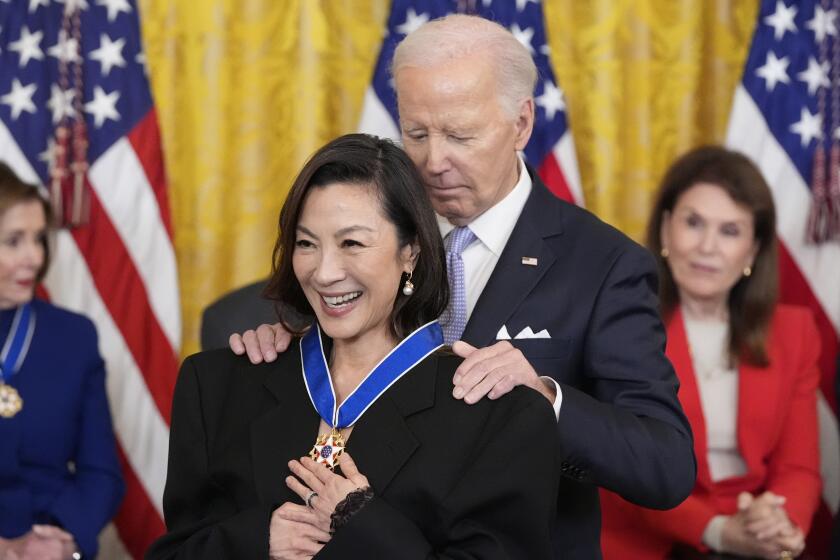Record Shots of Corporate Cash Enrich Parties
Despite the avowed commitment of the Democratic and Republican parties to campaign finance reform, each has been raking in contributions from corporations and wealthy benefactors at a record pace, according to a new analysis of the most recent campaign finance reports.
Republicans have benefited from a vastly increased flow of tobacco dollars as the industry seeks to counter an assault by the Clinton administration. The Democrats, for their part, have been fueled by generous contributions from trial lawyers, labor unions and Hollywood--as well as several unusually large individual gifts from nontraditional donors, including a great-grandnephew of Mohandas K. Gandhi.
Tobacco concerns have already given the Republicans $3.9 million--twice their total donations to the GOP for the entire presidential election cycle four years ago.
More than two months before the November election, the Republicans and Democrats have taken in far more so-called soft money than they garnered in the entire 1992 campaign, according to the new analysis--an assessment of records by the Campaign Study Group of Springfield, Va., a media-consulting company.
The total of such contributions for the Republican National Committee and various Senate and congressional committees is $75.2 million; for the Democrats, $67.4 million. In 1991-92, the GOP collected $36.9 million; the Democrats, $51.5 million.
*
By the November election, the parties each expect to raise as much as $120 million--a striking 173% jump since the last presidential election.
Both parties have benefited from the largess of Wall Street, health care interests, real estate developers and telecommunications companies. Indeed, the number of deep-pocket patrons of both parties--those who hedge their political bets by writing checks to each side--has doubled since four years ago.
The computer-assisted study analyzed Federal Election Commission records available from Jan. 1, 1995, through Sept. 1, 1996. Corporate contributions include all money given by a company, its political action committee and employees of the firm and their spouses.
Many of the major donors are companies, labor unions or advocacy groups that have high-stake interests in federal legislation and policy.
*
“There is an attitude of an arms race when it comes to money in politics,” said Ellen Miller, executive director of the Center for Responsive Politics, which tracks federal campaign contributions. “There’s no such thing as having too much money.
“The amounts of money are not extraordinary for corporate America,” she said, citing tobacco companies as an example. “This is a modest investment as a hedge against losing billions of dollars in future profits.”
Direct contributions to federal candidates, “hard money” in the language of campaign finance, are strictly limited. Corporations are prohibited from making such contributions and individuals and political action committees can only give limited amounts.
But corporations, labor unions and individuals are permitted to contribute unlimited amounts of soft money to the national political parties and Senate and congressional campaign committees to register voters, promote partisan allegiance and engage in other activities.
The money is not supposed to go toward endorsing or opposing individual candidates, but the parties have blurred those lines this year by running television ads focusing on presidential and congressional hopefuls without explicitly urging viewers to vote for or against the respective candidates.
Overall, the most lucrative source of funds for both parties has been financial-service companies. The Republicans received $12.2 million from the industry, including $5.5 million from securities and investment banking firms; the Democrats received $7.8 million, more than half of it from securities and investment companies.
The top donor to the GOP in this sector was Signet Banking Corp., which gave $431,621. It was followed by Reliance Group Holdings Inc., an insurance company controlled by financier Saul Steinberg, at $350,000, and PaineWebber Group Inc., at $340,000.
On the Democratic side, three executives from Goldman, Sachs & Co. contributed $395,000, and Dirk Ziff, chairman of Ziff Bros. Investment in New York, gave $380,000. Goldman, Sachs, the former firm of Treasury Secretary Robert E. Rubin, was a major Democratic donor in 1992; Ziff is a prominent Clinton supporter.
Many of the largest contributors gave lavishly to both parties. A study by Common Cause, a nonpartisan group that advocates campaign finance reform, found that 93 donors had channeled at least $50,000 to each major political party as of June 30--twice the figure for the entire 1992 election cycle.
*
The current partisan division of government, with Democrats controlling the White House and Republicans the Congress, encourages such split allegiance, campaign analysts said.
“Ideologically, a lot of the big companies are more attuned to Republican policies than Democratic, but they are realists,” said Herbert E. Alexander, director of the Citizens Research Foundation, which studies campaign financing. “They want the modicum of goodwill and the opportunity to be heard on issues that affect them.”
Tobacco companies have traditionally been among the double donors. They remain so but have reallocated the balance of their contributions to favor the GOP.
The efforts by the Clinton administration and Democrats in Congress to crack down on cigarette advertising and promotion, particularly those activities aimed at young people, and to regulate nicotine as a drug have apparently taken their toll. Republicans, including presidential nominee Bob Dole, in contrast, have come out against increased regulation of the tobacco industry.
Overall, tobacco interests anted up $4.7 million in soft money, only $750,512 of which went to the Democratic committees.
Three of the top five GOP donors were tobacco-related. Leading the way were Philip Morris Cos., which gave the Republicans a total of $1.6 million; RJR Nabisco Inc., $970,450; and U.S. Tobacco Co., the nation’s leading smokeless tobacco producer, $448,768.
Philip Morris, which sells food and beer as well as cigarettes, gave the Democrats $349,250, and RJR Nabisco gave $174,456. But these sums were only one-fifth the amounts these companies gave the Republicans. In 1992, they provided the Democrats fully half as much money as they directed to the GOP.
Darienne Dennis, director of communications for Philip Morris, said: “Philip Morris supports those candidates who share similar views regarding the issues affecting the companies’ businesses. We do it in hopes of getting good and fair government.”
Oil and gas companies, whose interests are impacted by such government policies as air pollution standards and laws governing drilling on federal property, also tend to be double donors. But their campaign dollars flow much more heavily to the Republicans as well.
The industry gave the GOP a total of $4.5 million. Leading the way were the Atlantic Richfield Co., with $615,175; Chevron Corp., $436,900; and Enron Corp., a Houston natural gas company, $274,000. In contrast, oil and gas companies sent $1.7 million to the Democrats.
The Democrats, meanwhile, were bolstered by more than $4.6 million in contributions from law firms and lawyers. The Assn. of Trial Lawyers of America, an influential Democratic ally, contributed $350,000. Two firms that represent large numbers of plaintiffs in personal-damage cases chipped in as well: Nix & Associates gave $360,000, and Milberg, Weiss, Bershad, Hynes & Lerach, $260,000.
Clinton has been responsive to the trial lawyers’ concerns. In May, he vetoed a bill they strongly opposed that would have limited damages in product-liability cases. Consumer groups also fought the measure, which passed Congress with large bipartisan majorities.
Nearly as much money, a total of $4.6 million, was collected from another historical Democratic backer: organized labor. The leading donors were the Laborers’ International Union of North America, $435,000; the Communications Workers of America, $345,125; the United Food & Commercial Workers International Union, $342,750; and the National Education Assn., $286,650.
*
The entertainment industry has also been a star in the Democratic financial firmament, to the tune of $2.7 million. Miramax Films gave $346,000; Time Warner Inc., $201,000; and Walt Disney Productions, $201,000. But the biggest hit came from the three founders of DreamWorks SKG: Steven Spielberg, $336,023; David Geffen, $205,127; and Jeffrey Katzenberg, $125,000.
Hollywood money is motivated by a mixture of ideology, ego and business interests, say party fund-raisers. Many executives and performers are liberal Democrats. Others value a chance to rub shoulders with presidents and senators. At the same time, studios have major stakes in issues ranging from intellectual property to access to domestic and global markets.
Although the Republicans have more large corporate donors, three wealthy individuals without a track record as givers each ponied up enormous sums to the Democratic National Committee.
Arief and Soraya Wiriadinata gave $345,000. The Indonesian couple, who listed Springfield, Va., as their residence, have returned to their homeland, according to published accounts. Neither DNC Chairman Don Fowler nor others at the DNC were able to provide any information about the Wiriadinatas.
*
Yogesh K. Gandhi, a great-grandnephew of Mohandas K. Gandhi and the head of the Gandhi Memorial International Foundation in Orinda, Calif., contributed $325,000. Yogesh Gandhi presented Clinton with the Mahatma Gandhi World Peace Award at the White House for his efforts in Bosnia and the Middle East earlier this year.
Raj Patel, an assistant to Yogesh Gandhi, said the contribution reflected Gandhi’s personal “commitment to the Democratic Party.” He said that Gandhi, who came to the United States 15 years ago, met Clinton during the 1992 campaign and was a generous donor at that time through an Indian organization in California.
The third benefactor was Richard Machado, a physician who owns several hospitals in Puerto Rico. He contributed $250,000. Fowler called him “a good friend who was brought in through another friend” of the party in Puerto Rico.
Times researcher Robin Cochran contributed to his story.
(BEGIN TEXT OF INFOBOX / INFOGRAPHIC)
Soft Money
A loophole in federal election laws through which corporations, unions and wealthy individuals can make unlimited contributions has been exploited by both parties at a record-breaking pace in this election cycle. These are the top donors to each party.
In millions
Three industries were among the top donors to both parties:
Financial Services:
Republican: $12.2
Democrat: $7.8
*
Health Care:
Republican: $5.1
Democrat: $3.7
*
Telecommunications:
Republican: $2.9
Democrat: $2.5
*
Other industries contribute heavily to one side:
Law Firms:
Republican: $0.97
Democrat: $4.6
*
Labor Unions:
Republican: $0.17
Democrat: $4.6
*
Oil and gas industry;
Republican: $4.5
Democrat: $1.8
*
Tobacco:
Republican: $3.9
Democrat: $0.75
*
Real Estate Developers:
Republican: $2.7
Democrat: $3.3
Source: Analysis of Federal Election Commission records by the Campaign Study Group, based on records available from Jan. 1, 1995, through Sept. 1, 1996
More to Read
Get the L.A. Times Politics newsletter
Deeply reported insights into legislation, politics and policy from Sacramento, Washington and beyond. In your inbox three times per week.
You may occasionally receive promotional content from the Los Angeles Times.






